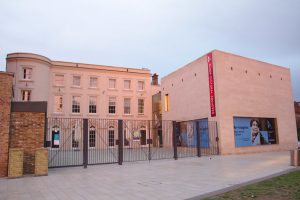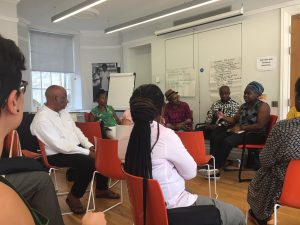October 1, 2019, by Jake Hodder
RACE group pre-conference: Black Archives workshop

Black Cultural Archives building, Brixton, London. Photo: Mark Longair / CC BY-SA 2.0
On 27th August 2019 the Royal Geographical Society’s Race, Culture and Equality (RACE) group held their annual RGS-IBG pre-conference event at the Black Cultural Archives (BCA) in Brixton, London. BCA was founded in the early 1980s and, after a successful Heritage Lottery Fund bid in 2010, found a permanent home in the former Raleigh Hall, a Grade II-listed Georgian building on Windrush Square. BCA is the UK’s first national black heritage centre as well as offering a focal point for the local community’s organising and educational work.
BCA was the ideal host for the RACE group’s ‘Black Archives workshop’ which considered both the BCA, but also the wider landscape of Black-focused research collections in the UK. The event was divided into two parts: a more conventional academic session before lunch with three papers and a series of informal discussions in smaller breakout groups after lunch.
The event launched the RACE group’s report Black Archives in the UK: Opportunities, Challenges and Moving Forward written by Natalie Hyacinth. Drawing on in-depth interviews, the report offers snapshots of various Black archives including the London-based Black Cultural Archives, George Padmore Institute and NOMAD/Somali Archives, as well as a range of regional collections, including the Nottingham Black Archive, Birmingham’s Vanley Burke archive and the Race Archive in Manchester.
The report, and the discussions which followed at the workshop, centred on a number of themes: the current state of black-focused collections; their future prospects and challenges; how Black archives question the nature of archival records themselves; and the bigger political and historical contribution which black collections prompt. Indeed, it is the latter point which best explains the generosity of time and effort which many archivists had given to sustaining these collections despite often challenging circumstances. One of the real joys of the event was how many of those connected with the archives above were also able to attend.

Royal Geographical Society Race, Culture and Equality (RACE) group pre-conference workshop. Held at Black Cultural Archives, Brixton, London, on 27 August 2019. Photo: Angela Last
Three papers were offered before lunch. Rashad Shabazz, associate professor of justice studies at Arizona State University, explored the geographies of race and music that shaped the emergence of the ‘Minneapolis sound’, which was pioneered by Prince in the late 1970s. Natalie Hyacinth’s paper reflected on the interviews and themes of her report mentioned above. The final paper was offered by Hannah Ishmael, who reflected on her PhD research, which charts the story of several London-based Black archives, as well as her more recent experience as archivist at the BCA.
The afternoon session consisted of smaller group discussions reflecting on the opportunities and challenges faced by Black archives. Rashad, Natalie and Hannah’s papers offered a valuable springboard for these discussions. In particular, Natalie identified three common themes. First, that Black archives existed in various degrees of precariousness. Secondly, that there is often a tension between the desire for Black archives to remain independent and the need to secure outside funding. Thirdly, the significant role of local networks. Many of the archives frequently connected with local heritage and culture networks, were steered by the local community and supported by community engagement.
It was clear through these discussions that Black archives had emerged in a largely uncoordinated fashion, instead they were often in response to community needs, driven by specific individuals and reflective of particular political moments. The story of black archives is therefore one of both dynamism and instability; of ‘rupture and renewal’. One of the real benefits of the workshop, therefore, was in bringing together academics, archivists, community activists and others, in many cases for the first time.
The point that was made most powerfully however was that, beyond the unique histories contained in each of these collections, the story of Black archives themselves (their formation, displacement, struggles) tells a bigger story. They are not simply windows on black history but a proxy for it. As Natalie writes in her report there is a clear relationship ‘between the precarity of Black archives [and] the precarity of Black lives’.
No comments yet, fill out a comment to be the first

Leave a Reply